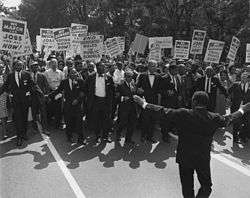Joseph L. Rauh, Jr.
| Joseph L. Rauh, Jr. | |
|---|---|
| Born |
January 3, 1911 Cincinnati, Ohio, U.S. |
| Died |
September 3, 1992 (aged 81) Washington, D.C. |
| Alma mater |
University of Cincinnati Harvard Law School |
| Religion | Judaism |
| Spouse(s) | Olie Westheimer |
| Children | 2 |
Joseph Louis Rauh, Jr. (January 3, 1911 - September 3, 1992) was one of the United States' foremost civil rights and civil liberties lawyers. He was posthumously awarded the Presidential Medal of Freedom, the nation's highest civilian honor, by President Bill Clinton on November 30, 1993.
Early life
Rauh was born in Cincinnati, Ohio, the son of a German immigrant shirt manufacturer. He did not follow in his father's footsteps, however, shirking textiles for Harvard University. There, he played center for the Ivy League school's basketball team. He graduated magna cum laude with a degree in economics in 1932, continuing his education at Harvard Law School, where he finished first of his class.[1]
After clerking at the Supreme Court, Rauh eventually was commissioned into the Army at the rank of lieutenant in 1942, working as a lend-lease expert in the midst of World War II. He ultimately reached the rank of lieutenant colonel. He returned to Washington after the war and worked in private practice, focusing his efforts on fighting for civil liberties.
Civil Rights and Liberties Work

Rauh is best known for his championing of various civil rights causes. In 1947, he helped found Americans for Democratic Action, alongside Eleanor Roosevelt and Hubert Humphrey, among others. Starting as a Democratic National Convention delegate in 1948, he was a leader that year in writing up the civil rights plank for Humphrey. In the letter of support promoting his award of the Presidential Medal of Freedom, its authors described the plank as "the foundation for all of the human rights and equal protection laws that have since been enacted".[2]
In 1959, Rauh successfully represented Quaker printer David H. Scull before the United States Supreme Court in Scull v. Virginia ex rel. Committee on Law Reform & Racial Activities, which concerned aggressive and unclear questioning by the pro-segregation chairman of a Virginia legislative committee, which had led to a contempt citation the Supreme Court overturned.
Rauh also lobbied Congress for the passage of many civil rights bills, having a hand in the passing of the Civil Rights Act of 1964, the Voting Rights Act of 1965 and the Civil Rights Act of 1968. In addition, he fought against McCarthyism and was a long-time executive board member of the National Association for the Advancement of Colored People.[3]
Awards and Honors
In 1983 he received the four freedom award for the freedom of speech.[4]
References
- ↑ Saxon, Wolfgang (September 5, 1992). "Joseph Rauh Jr., Groundbreaking Civil Liberties Lawyer, Dies at 81". New York Times.
- ↑
- ↑
- ↑ http://www.rooseveltinstitute.org/four-freedoms-awards
Further reading
- Parrish, Michael E. (2010). Citizen Rauh: An American Liberal's Life in Law and Politics. Ann Arbor: University of Michigan Press.